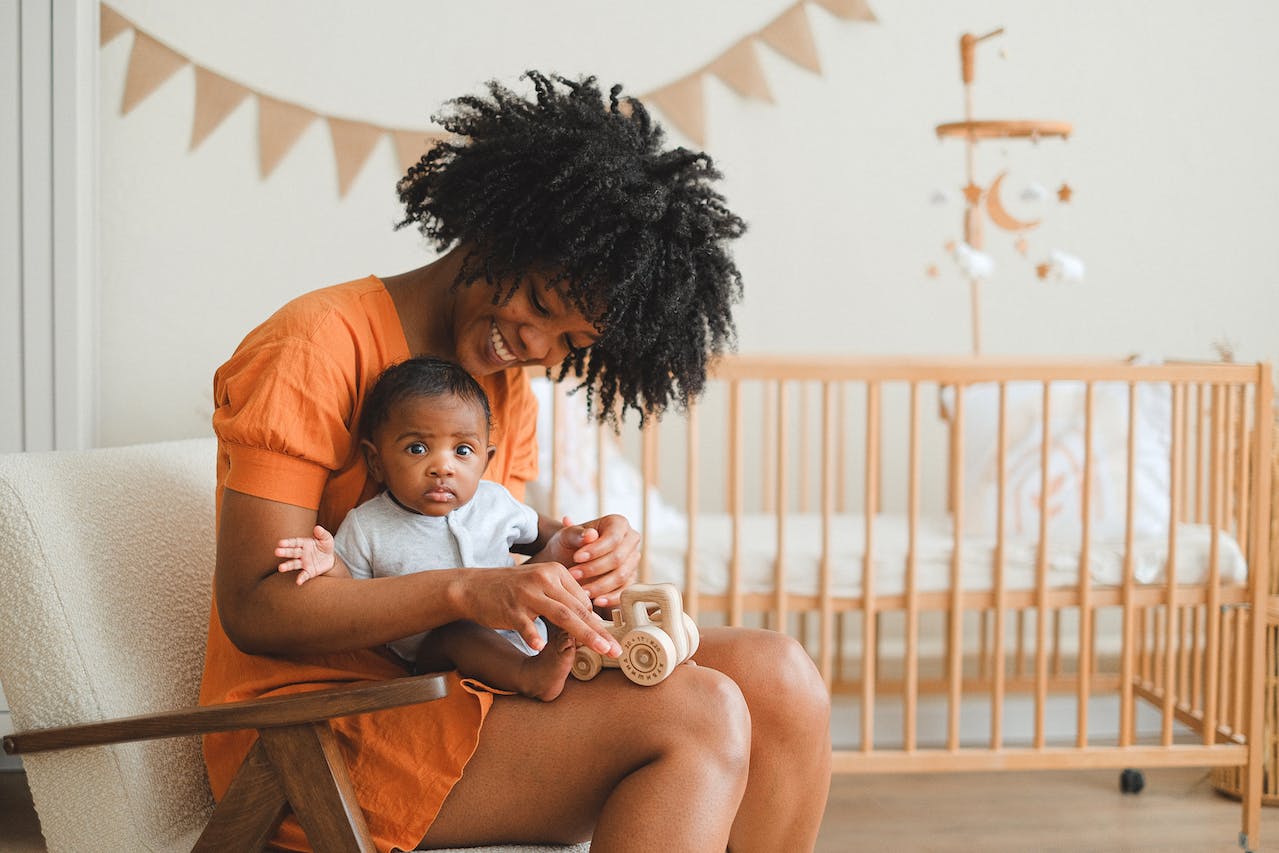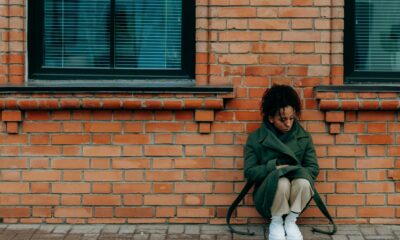Features
BN Prose: If Dee Jay Had Lived by Titilayo Olurin
…if I had not brought him home from the hospital in a coffin instead of a cot.

Mother hovers over me. She adjusts one of the throw pillows on the chair, dusting off invisible specks of dirt and straightening its blue and pink knitted cover. She rearranges the contents of the tray on the centre table before me, her hands busy, deftly moving items – a bottle of water, an empty mug, some cutlery, and two covered dishes. Then she walks briskly to the windows, her flip-flops slapping the tiled floor as if in anger. She draws the curtains apart, her long, slender fingers fussing with the curtain ties, and opens the windows, one after the other. Grains of sunlight flood the living room, and I squint my eyes.
“Omotoyosi, won’t you eat something?” She is back at my side, a worried frown settling on her brows. “Eat something now.”
I stare past her, at the woman in the large painting hanging on the opposite wall, and say nothing. The woman stares back, her eyes a strange mixture of sadness and glee. Naked down to her waist, with a suckling child hanging precariously onto one of her breasts, her bottom in her mother’s lap, the woman sits on a low stool beside a large pot cooking on burning wood, a ladle in one hand and a sieve in another. A half-clad child stands over the pot, stirring its content, and about a dozen others, just as half-clad as the first, stand around in different positions, their bare feet digging into the ground that is soft, moist and red.
“O de joor! Eat something, please.” Mother opens the dish, picks a spoon, which she uses to scoop some pap, and raises it to my mouth. I fold my lips and turn my face away.
“It’s only pap. Dakun joor! Or would you eat Akara instead? It’s your favourite. You remember how you used to love it, before …” Mother swallows. A pause follows. Then she says, “Just eat something.”
She opens the second dish, the smaller one, and the smell of bean cake hits me. A familiar wave of nausea, not different from what I felt in those first three months, sweeps through me. I scrunch up my face, my nose twitching, and turn my face even farther away.
“What is wrong with you, Omotoyosi?” Mother’s voice is a pitch higher. “Bathe and tidy up. Iro o! Eat nko. For where? All you want to do is mope and whine about how miserable your life is. Some women have it worse than you.”
I feel heat rise in my belly. It flares through my body and settles in my engorged breasts, gnawing at one tender nipple and the other. I wince in pain. I want to speak but I have lost my voice, which seems buried beneath layers of heat burning through me. When I am finally able to speak, it is in a voice I do not recognise as mine. It is hoarse and cracks so much that I fear that I will start to cry. But I blink back the tears and look into my mother’s eyes.
“Is my life not miserable, Maami? Which part of it is not miserable? Tell me!”
Mother looks away, as if in shame. Her lips twitch, like she wants to say something then changes her mind. She reaches hesitantly for the sleeve of my nightdress, the same one I have been wearing since the night we returned from the hospital. It now smells strongly of stale sweat, breast milk and camphor, which Mother has insisted on placing in every corner of the flat because “these ants should not take over your house, Omotoyosi!”
“I didn’t mean …” Mother starts to say, her hands now wavering indecisively between the sleeve of my nightdress and my bare arm. “All I’m saying is, another one will come, and another, and another. There’ll be many more to come.”
I squeeze my eyes shut, tuning out my mother’s voice, and rest my head against the chair. Mother is saying something about how God turns the biggest disappointments into blessings, as she noisily clears the tray from the table. She sounds just like the women from the All Souls Church, where I am a member of the choir. They had visited only two mornings ago and did not fail to punctuate their every sentence with how “the merciful God giveth and taketh” and cannot be questioned. They said it like it was somehow supposed to make me feel better.
“Sounds like a wicked God!” I had spat through my teeth, after hearing it for the umpteenth time.
They stared at me in horror. The women. All eight of them, who had trooped into my flat in similar Ankara wrappers and scarves, invading my privacy, with dirt from the soles of their shoes trailing in after them.
“Awuuu!” someone had said, snapping her fingers in front of her.
My mother had glared at me before shaking her head and blinking repeatedly as if willing me to stop embarrassing her.
I pretended not to see her, and mimicked with a sneer, “God giveth, God taketh!”
This elicited more reactions – loud gasps for the most part. I ignored those too, and continued in a voice raked with sorrow, “Why would a kind God give me something so precious only to take it away from me?” There was silence then. No one gave me an answer, and I didn’t push.
Now, my mother’s voice fades to a small part of my mind where I have forced it to. Her voice fades, just like the sound of her flip-flops slapping the floor when she retreats to the kitchen moments later, where she frets with pots and pans. She is soon back with another tray, which she sets on the now empty table.
“This one is fresh and hot. It tastes really nice, have some.” Mother opens the dish, and the smell of catfish pepper soup chokes me and stings my eyes.
“Take it away!” I raise my hands to my face. “Take it away, Maami! I do not want it.”
Mother hesitates then sighs, and carries the tray back into the kitchen. She returns almost immediately and sits beside me with a heave. She does not attempt to speak, and I am grateful for the quiet. Suddenly, she clears her throat loudly, breaking the silence, and cups my elbow in her palm, before whispering, almost conspiratorially, like there is a shared secret between us, “Better it happened now than later.”
Something akin to anger forms within me. Only that it is not anger, it is worse. It threatens to take on a shape of its own, with horns for ears, something fiery for eyes and something even more monstrous for its head, complete with smoke emitting from it. But I swallow it, whatever it is. The same way I swallow those bitter pills prescribed by the doctor. I snatch my elbow from my mother’s hand and say quietly in disbelief, “What did you say, Maami?”
“It is good that it happened now,” Mother pauses for air, “than later when he had grown into a child.”
“He was a child!” I turn eyes puffed up with tears and lack of sleep at my mother. “My child!”
“Yes, yes. Of course. I know.” Mother shifts her buttocks uncomfortably. “What I mean is, you didn’t get to know him. It was better now than later when you had grown to love him.”
“But I loved him! I love him!” I scream, spurting saliva freely, the veins in my head and neck shooting out like they would burst. I stop to catch my breath and swipe the mixture of snot, saliva and tears on my face with a hand while I grip the arm of the chair with the other to help myself up. Mother moves to help me, but I pull away.
“I love him! With everything, Maami! With everything! Do you understand that?” I stand, towering over her, my face wet with tears and squeezed in agony and rage. She takes a look at me and cowers in the chair.
I turn and run as fast as the blinding tears in my eyes will let me. In the safety of the bedroom, the one I shared with Dokun until I banished him to the living room couch, I throw myself on the bed and cry, drowning out my mother’s pleas behind the firmly bolted door. I cry till it seems like I have dried up my tear glands. Finally, I drift into a listless sleep, and dream of the son that would have been named Oladokun – like his father, my husband. He would have been my first child and I would have doted on him. I would have called him Dokun Junior. Maybe I would have stretched out the Dee and the Jay affectionately and called him Dee Jay, not DJ like the neighbour who shouts out her husband’s name ever so flippantly from their balcony on the top floor. He would have been my Dee Jay or Dee Jay Pumpkin or Dee Jay Bear. If he had only lived and I had not brought him home from the hospital in a coffin instead of a cot, just days after he was born.
***




















